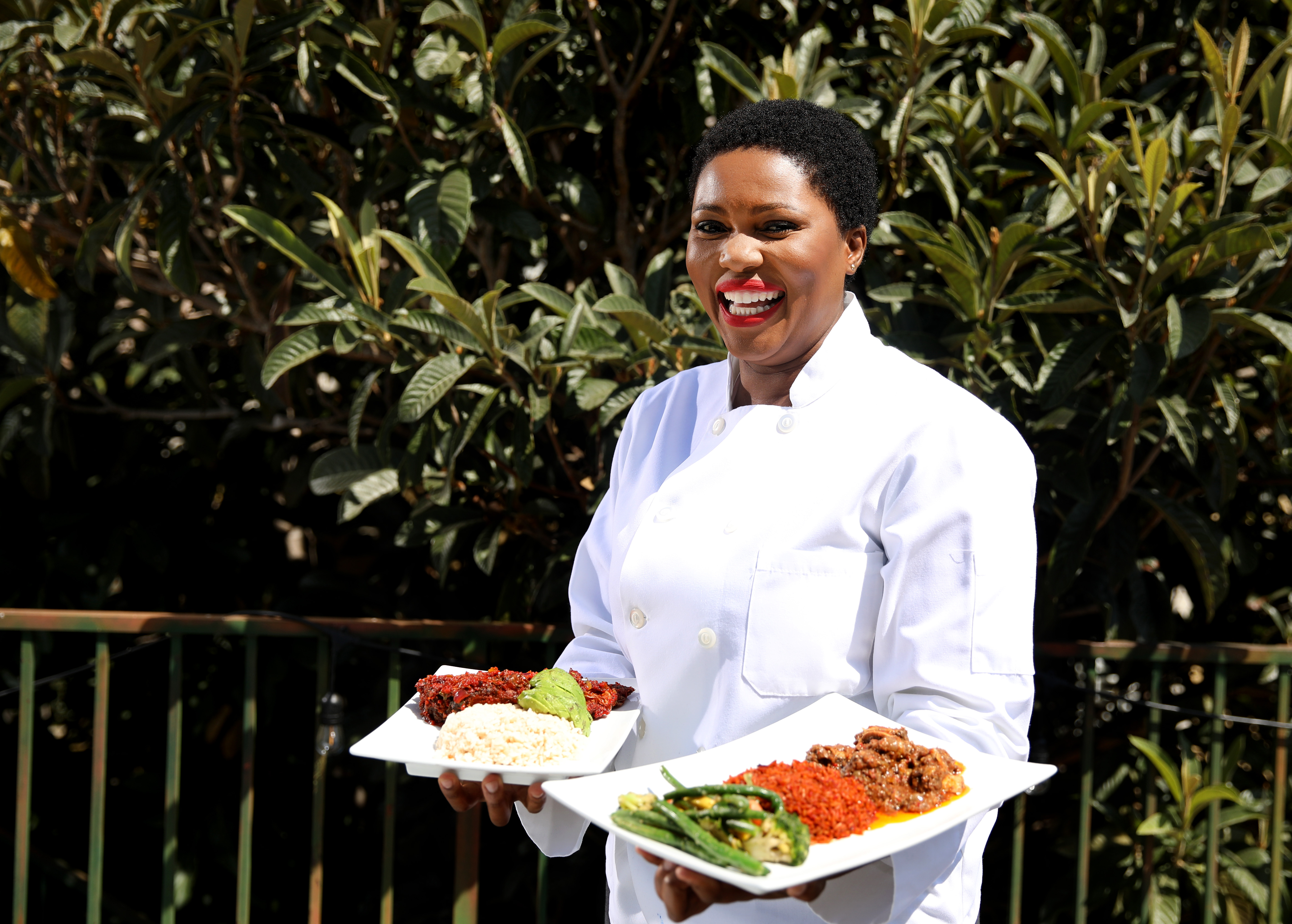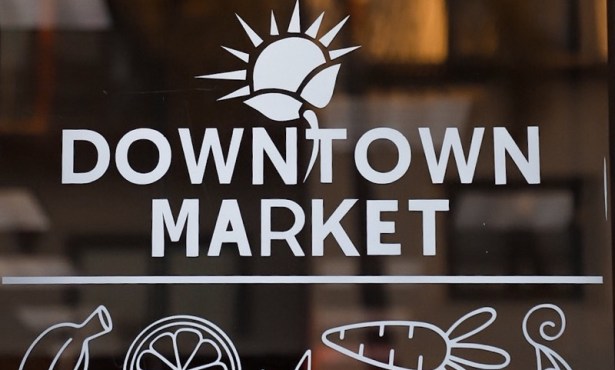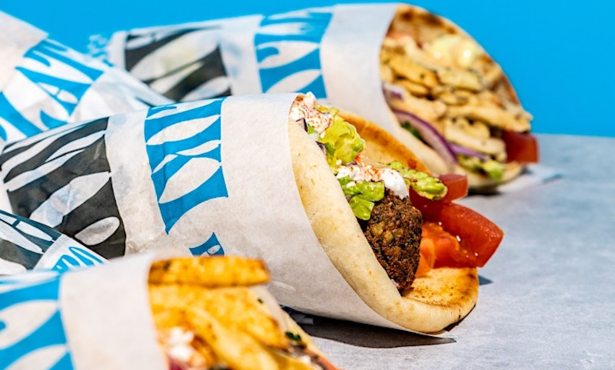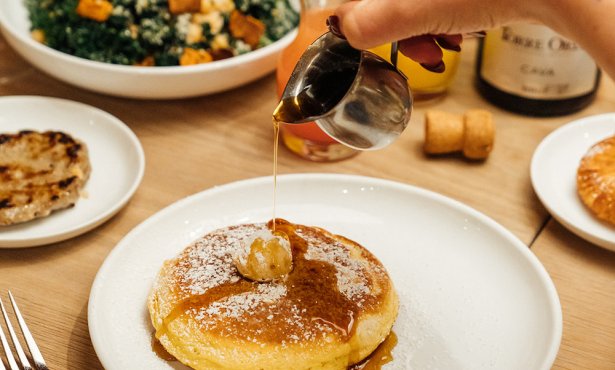Patience Ncube Brings African Cuisine and Clothing to Santa Barbara
Zimbabwe-Born Entrepreneur Now Selling Afro-Fusion Food and Bantu Styles

While attending Santa Barbara City College and then studying entrepreneurship at Antioch University, Zimbabwe-born Patience Ncube didn’t need any help identifying Santa Barbara’s dearth of African cuisine and culture. To fill that void, she’s launched two enterprises to share her Bantu roots with us: the clothing, shoes, and accessory company called Bantu Crafted and Afro-Fusion Catering, which delivers, literally, the flavors of western, central, eastern, and southern Africa to our doorsteps.
Although she grew up in Zimbabwe’s metropolitan capital of Harare, Ncube frequently visited her grandmother’s village, which was devoid of any of Western conveniences, like a refrigerator. Ncube ’s menu is a combination of the recipes that her grandmother passed down to her as well as dishes gleaned from friends in other African countries.
After teaching jobs in Zimbabwe and England, Ncube came to Santa Barbara in 2009 for more schooling, getting degrees in math, science, and economics from SBCC and then a BA and master’s from Antioch in business, leadership, and organizational management. She’s worked as an employment specialist for PathPoint since 2015. “While it was scary,” she said of her leap to California, “it was exciting because it was an opportunity to seek greener pastures.”
Get the top stories in your inbox by signing up for our daily newsletter, Indy Today.
She’s hoping to sprinkle a bit more of Africa onto those pastures today with these two businesses. “I love sharing my culture,” she said. “That’s how we build community.”
Ncube started Bantu Crafted in 2016 by importing handicrafts made by women in Southern Africa. “The goal is to market the work of mainly African women and open up their work to larger markets,” she explained. “It’s my way of contributing to economic development back home and empowering families and communities toward self-determination.”
On the culinary side, Ncube’s initial idea was to do a series of pop-ups. But such fun wasn’t in the cards for the pandemic of 2020, aside from a curbside pickup fundraiser and some sporadic deliveries. Instead, in September, she officially launched Afro-Fusion Catering as a meal subscription and private catering service, showcasing a full menu of options via AfroFusions.com.
The family-style meals come with a choice of sides that may sound unfamiliar or unusual to most American ears, but can lure even fussy foodies-in-training. Ugali, also known sadza, is a maize-based food that’s a natural fit for fans of grits or, given its density, polenta. Chapati is an African bread akin to East Indian paratha, which is similar to naan. Rice options include coconut rice, jollof rice (simmered in tomato and pepper sauce), or peanut butter rice. No Skippy is harmed in its preparation, as the rice is simmered in an African peanut sauce made from organic peanut butter and crushed peanuts. Additional options include plantains or sautéed veggies.

The delivery menu remains a work in progress, always being updated according to better selling dishes that appeal to local palates. Menu items are also affected by limited availability of ingredients.
Seasoning-wise, African cuisine includes cayenne, paprika, chili powder, cumin, coriander, and plenty more found in curries and other spice-filled delights. “There’s no spice we don’t use, to be honest,” explained Ncube.
Afro-Fusion’s meat dishes include beef, chicken, and, in lieu of native African fish, snapper and tilapia, which is actually found in Zimbabwe. Mbuzi, which means “goat” in many African dialects, is the star of the piquant mbuzi curry. Oxtail stew is also a fixture of the menu. Nothing goes to waste in African cooking — “We eat everything but the hooves,” promised Ncube — but offal still is largely dismissed in many American kitchens.
The piripiri sauces, including mango habanero and pineapple green chili, are the African-style hot sauces that kickstarted Ncube’s first food concept in 2012 and are deserving of their own cult following. The original idea was to start a line of bottled African sauces to fill the gaping hole found in supermarkets between the Latin-American and Asian flavors featured in the “ethnic” aisles.
Relegated to the secret menu is gizdodo, which are plantains garnished with peppered chicken gizzards. These bite-sized gizzards are chewy but high in protein, low in fat, and the one part everyone in my family fought over on our baked chicken night.
There’s another item that is also sure to cause family in-fighting over who gets the last one: puff puff. These egg-shaped pillows of fried dough — think African æbleskivers — go by many names from one African country to another, but puff puff seems to be the common denominator. They’re a testament to how doughnuts, for lack of a better analog, can be quickly beloved by any palate, no matter which culture creates them.
Ncube’s puff puff style is based on her grandmother’s version, but she puts an American spin on them, adding mango and chili, or coconut, or chocolate, among other flavors. “That’s my infusion,” beamed Ncube. “I’m a big foodie.”
AfroFusions.com; BantuCrafted.com
Every day, the staff of the Santa Barbara Independent works hard to sort out truth from rumor and keep you informed of what’s happening across the entire Santa Barbara community. Now there’s a way to directly enable these efforts. Support the Independent by making a direct contribution or with a subscription to Indy+.




You must be logged in to post a comment.